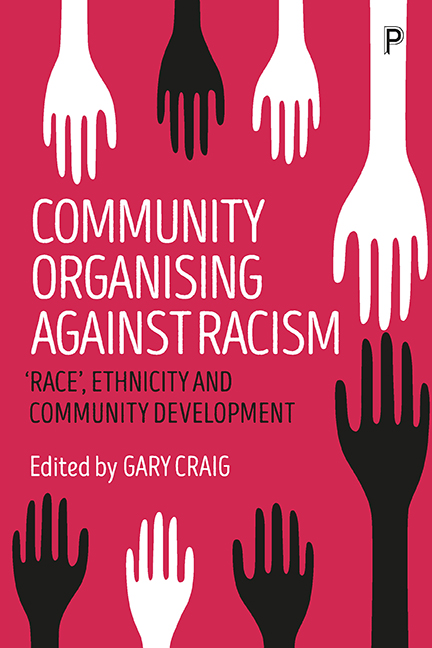Book contents
- Frontmatter
- Dedication
- Contents
- List of figures
- Author biographies
- List of abbreviations
- Introduction
- Section One Community development with ethnic minorities: history, theory, policy
- Section Two Building capacity with BME groups
- Section Three Working with Roma communities
- Section Four Global experience
- Section Five Working across cultural boundaries: ideological and personal reflections
- Afterword: Messages for community development in working with minority groups
- Index
Section Three - Working with Roma communities
Published online by Cambridge University Press: 12 April 2022
- Frontmatter
- Dedication
- Contents
- List of figures
- Author biographies
- List of abbreviations
- Introduction
- Section One Community development with ethnic minorities: history, theory, policy
- Section Two Building capacity with BME groups
- Section Three Working with Roma communities
- Section Four Global experience
- Section Five Working across cultural boundaries: ideological and personal reflections
- Afterword: Messages for community development in working with minority groups
- Index
Summary
This small section (and I should also point to Chapter Twelve, on work with Roma youth from Romania, in the following section) quite deliberately focuses on community development work of different kinds with Roma, Gypsy and Traveller groups as a contribution to redressing the imbalance whereby these most deprived groups – by any measure and within every European country – have been the most profoundly ‘invisibilised’ (a term I used in relation to the treatment of the issue of ‘race’ in UK public policy) by governments throughout their 400 or 500-year history in the Continent, only finally emerging into public view as the subjects of victimisation, discrimination and genocide, most of all during Hitler's ‘final solution’. The three accounts here – two from Scotland, one from England – will give the reader some idea of the profound levels of discrimination still faced by these groups whether, as in the case of Gypsies and Travellers, largely nonsedentary, living both on caravan sites and on the move, or, as in the case of the many thousands of Roma who have moved to the UK from East and Central European countries following the enlargements of the European Union in 2004 and 2007, living in the most deprived and unhealthy housing areas of towns and cities across the UK. They also give some idea of the size of the task facing community development workers, both because of the levels of deprivation they suffer, the mistrust of gorgas (white people) as a consequence of the hundreds of years of discrimination and abuse they have suffered, and the more general hostility they face from local settled communities. As a result of these challenging conditions, community workers often have to be satisfied with what might seem, in other contexts, relatively minor gains.
In Chapter Nine, Hashagen and his collaborators’ work with Roma moving to Glasgow, Scotland's largest and most multi-ethnic city (in terms of numbers and diversity), situates work with Roma within a long tradition of community development in the city, including with minorities of different kinds. The account here, covering 10 years, allows us to see how the work moved from building links and organisational responses to ensure that this deprived population was able effectively to access a range of basic services, through advocacy, to more structured forms of organisation.
- Type
- Chapter
- Information
- Community Organising against Racism'Race', Ethnicity and Community Development, pp. 155 - 158Publisher: Bristol University PressPrint publication year: 2017



